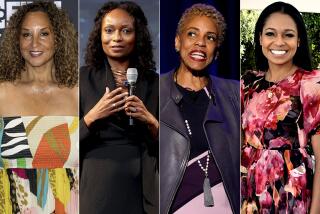Golden Globes group’s chief diversity officer says the HFPA is ready to ‘do the work’
- Share via
Last month, as part of its ongoing efforts to enact promised “transformational change,” the Hollywood Foreign Press Assn., the group behind the Golden Globes, hired Neil Phillips as its first-ever chief diversity officer.
Phillips, an Aspen Institute Education Entrepreneurship Fellow and a member of the inaugural Echoing Green/Open Society Foundation Black Male Achievement Fellowship, joined the organization after months of HFPA criticism and calls for reform following a Times investigation that revealed the association had no Black members and detailed allegations of financial and ethical lapses within the group.
Phillips’ appointment comes as the HFPA has forged a five-year collaborative partnership with the NAACP. But it also arrives after a string of turbulent incidents for the group, including a leaked email that former eight-term HFPA President Phil Berk sent to the group in April that called Black Lives Matter a “racist hate movement.” Soon after, the association’s initial diversity consultant, USC professor Shaun Harper, resigned.
Phillips spoke with The Times about the recent firestorm around the group and how he plans to tackle issues of diversity and equity going forward both within the organization and across the entertainment industry.
The HFPA faced intense criticism earlier this year over its lack of Black members, and the diversity and inclusion advisor they hired in March exited six weeks later. Given the history, what made you decide to take on this role?
I became generally acquainted with the challenges the HFPA was enduring from a distance. It felt to me then, as it feels to me now being even more deeply acquainted with it, that the criticism was well deserved — that this was an organization that was underrepresented in terms of its Black journalists. And that needed to be addressed, and I have been very pleased and impressed by what I have come to know as the organization’s response to that criticism.
When you look at issues of underrepresentation — far beyond the HFPA, far beyond the film and television and entertainment industry ... there tend to be structural challenges that lead to them within the organization. So when I learned that the HFPA was taking a very deep and comprehensive look, not just at the numbers and what numbers needed to be shored up, but at how it functions — things like eligibility requirements and the credentialing process — and making substantive changes to those policies and procedures, that told me that this is an organization that’s going about this the right way ... in a thoughtful and committed way.
As I got even more acquainted with the leadership of the organization, and [President] Helen [Hoehne] in particular, when I got a sense that their efforts were aimed far beyond emerging from a crisis, beyond weathering a storm, but aimed long term at modeling, practicing and championing really deep-rooted diversity, equity and inclusion initiatives, that was an organization that I wanted to be a part of.
This is a new position for the organization. Can you discuss how you view your role within the HFPA?
I’m really taking a look at, what does the HFPA need this role to be? What’s clear to me is that the HFPA needs this role to ensure that diversity, equity and inclusion issues are being met with the attentiveness that they deserve, that these considerations around diversity, equity and inclusion are always at the forefront of any organizational consideration. Sometimes they’re going to be the core, sometimes it’s going to be peripheral, depending on the issue at hand. But it’s going to be my role to make sure that the diversity, equity and inclusion piece is always being considered and acted upon in a way that benefits the organization and, as a result, benefits the industry.
I can tell you what the role is not. The role is not, “How do we help the HFPA weather a storm or emerge from a crisis?” That’s not what this role is about. This role has a far higher aspiration than that.
In October, the HFPA invited its largest-ever class of new members, including six Black journalists. In your mind, did that take the issue of the lack of Black members off the table, or is there a longer-term goal for where you think the HFPA should be in terms of the composition of the group?
The short answer is no, it doesn’t take the issue off the table. We need more Black journalists to be members of the HFPA, and that’s going to happen.
There’s more to this than the numbers. One of the things that diversity attentiveness does is it enhances an organization. Expanded membership impacts the way the organization functions and the impact that it has on the industry.
So you don’t have a particular goal in mind of how many Black members you would like to see in the HFPA?
I don’t have that number in mind at all, other than to know that we’re committed to more.
Last year, the HFPA rejected the idea of bringing on board a diversity and equity inclusion consultant, with many of the members arguing that the group was already diverse because its members came from around the world. How does that inform the work that you’re doing with the organization and its ability to understand the importance of this issue going forward?
I can’t speak much to the positions that folks held in the past. ... I don’t have any perspective on that. What I can say is that the position exists now, and my focus is on what I can do in the present, and future, to ensure that this role helps the organization expand the way that it thinks about its membership and the way that it thinks about its influence on the industry.
I’ve had an opportunity to address the membership, and while every member wasn’t in attendance, we had most of them there on-site [and] a significant number on Zoom. What they heard from me was, “Look, I understand it’s been a very difficult time. I believe that the criticism that was leveled upon the HFPA was well deserved, and I’ve been really impressed by how the organization has responded and its pledge to continue to respond.”
Most of all, they heard optimism. This is an organization with significant impact over the course of 78 years in an industry that has significant impact, globally. Often we focus on the negative, the criticism, the backlash — and that’s all real, so I get it. But I focus on the opportunity and the optimism of what happens when an organization evolves and transforms.
In October, the HFPA announced a five-year partnership with the NAACP. What are you hoping for from that partnership?
I can’t tell you how excited I am for this partnership. We’re going to continue to encourage and support internships and fellowships and mentoring opportunities. We’re going to do some work with them around the restoration of some older Black films and some films that have chronicled the NAACP history. We’re going to be trying to create opportunities for creatives of color to find their way into film festivals around the world where those paths have been more limited..
Earlier this year, the organization faced criticism from some powerful figures in Hollywood including Ava DuVernay and Shonda Rhimes, as well as organizations like Time’s Up and Color of Change, for historically overlooking Black-led projects. Have you had any conversations with any of them or anyone in the coalition of publicists that led a boycott of the HFPA about those concerns?
I haven’t had conversations with anyone that you’ve mentioned. But I am very eager to have those conversations, and I really hope to have the privilege of spending time with some of the folks you’ve named and others who have criticized the HFPA who have perspectives and insights. It will help me to understand a fuller picture of history that will inform the work that I do with the HFPA moving forward.
Some within the HFPA have pushed back by saying that some of their critics have their own issues when it comes to inclusion. Do you think that’s a valid counterargument?
I just don’t think it’s very helpful at this point. I just think that the focus has to be on the work. It’s the work that’s going to yield the kinds of results that we want to see, and nothing but the work. So I don’t have any time at all to kind of go back and forth like that — it just doesn’t feel like it’s time well spent.
Another argument some HFPA members have made is that there are just not many Black entertainment journalists working for foreign outlets. Do you agree with that assessment, and if so, what would you like to see done to widen the pool of potential applicants of color?
You often hear that: “Well, we can’t find enough women to promote to executive leadership positions” or “We can’t find enough Black men to fill out our applicant pool at this particular college.” I just don’t buy that.
You have to look at how your organization functions — your eligibility criteria, your habitual outreach paths — and these are things the HFPA has done. They’ve made alterations to policies and procedures. They’ve expanded their outreach mechanisms. They’ve eliminated certain requirements that narrowed the path rather than expanding it.
The thing I want to emphasize is that there’s no quick fix here. Some of these changes that have taken place, they’re really material and they matter. But we’ve got to continue to do the work over a period of time to yield the results that are necessary and I believe are really attainable.
More to Read
Inside the business of entertainment
The Wide Shot brings you news, analysis and insights on everything from streaming wars to production — and what it all means for the future.
You may occasionally receive promotional content from the Los Angeles Times.











